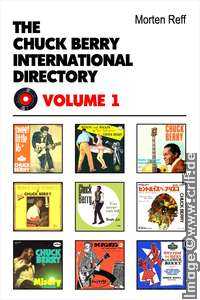
Thursday, February 21. 2008
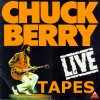
A few weeks ago I learned about a new CD out there. Deliver Me From the Days of Old (Crying Steel Records CSR001) was a bit difficult to get as it is not stocked by the usual CD shops on the net. Even though this is a professional looking CD, it seems that the creators of this CD did not have the rights to publish the recordings contained.
The CD is a collection of all the Berry recordings never transferred to CD before - well, maybe not all, but many. You'll find Roll 'Em Pete, the Chess recording even missed in the Charly 9-CD set. You'll find the two recordings from the American Hot Wax soundtrack. There is the complete Tokyo Session LP and the two extremely rare recordings from the album The Day of R&B. All the stuff you have in your vinyl collection but never listened to for years.
In addition the CD contains the four songs recorded during the Newport Jazz Festival 1958 which were to be found on a rare Swedish CD before only. And finally they included the two unreleased Chess masters taken from the ARC Music Promotional CD. For details read the corresponding sections of this site.
This is a lot of good stuff. Whoever created this CD really knew about Chuck Berry recordings and what is easy to get and what not. The same holds for the 8-page booklet which has many excellent Berry photos in addition to complete details about the included recordings. They even included cover photos of the original vinyl albums. Very well done!
To my ears some of the vinyl transfers run too fast, maybe ten percent or even more. But what really is a pity is that this CD is not official meaning that you have to hunt for it on record markets. This collection should have deserved better.
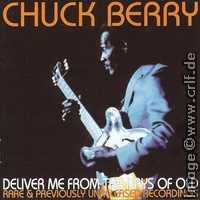

Wednesday, February 13. 2008

On February 6th, 2008 Chuck Berry received the Golden Camera Lifetime Achievement Award. The show was recorded in Berlin and broadcast by German TV two days later.
I had to record the show on video due to business travel. But when I looked at it today, it was more than disappointing.
The introduction by Klaus Meine was ok, even though it was nothing more than just a few sentences everyone could have said by reading any half-page biography. Why didn't Mr. Meine tell a bit about how Berry's music influenced him personally or the Scorpions as a band?
When Chuck entered the stage, the standing ovations from the crowd (all famous TV people by themselves) was long and great. It was easily to see how much Chuck was moved emotionally. Looked like this was not something he went through often before.
Chuck's thanking speech was basically a poem recitation. I really would have liked to hear this in his original language. Unfortunately German TV found it necessary to not only translate Chuck's words, but also to broadcast this translation much too loud. The translation of course was no longer in rhyme or even a poem, just some senseless sentences. A pity! If someone has a recording of the speech in original language, I'd love to get a copy.
And then came the worst part of all. Chuck Berry lip-syncing to "Roll over Beethoven". A song he still performs today in every concert multiple times each month. But German TV (as most other TV stations today) requested play-back. So we see Chuck standing in front of a band of famous German musicians. And we hear the Chess recording of 1956 play! There's the famous guitar solo - but there is no lead guitar on stage! Chuck just singing (well, opening and closing his mouth). The rhythm guitarist always turned his back to the camera, obviously ashamed of this performance. You see the musicians exchange views and shaking their heads. What a pity! This could have been a great moment, but it was just shameful.
Niels Rozeboom placed a video recording of the Berry segments at YouTube, in case you want to look for yourself: http://www.youtube.com/watch?v=HmVfHzZz50U
The best part of the show Niels missed to post, though. Because also Robert De Niro received a Lifetime Achievement Award, each and every woman on stage talked to De Niro who was waiting in the audience, either requesting a date or an autograph. Only German TV clown Stefan Raab took the opportunity to tell: "Sorry Mr. De Niro, but I love Chuck Berry!"
Late addition: Wolfgang Guhl pointed me to an article on echo-muenster.de. There Steffi Stephan explained that a live show was planned first, but did not work out due to "organizational complications". Which means that the organizers could not provide Chuck with the guitar he requested, and that they could not agree on the numbers to perform. Thanks for the link, Wolfgang!

Thursday, January 31. 2008
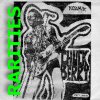
Chuck Berry where?
Baarn is a small town in the Netherlands, not far away from Hilversum. I do not know if Berry ever played a concert in Baarn and I strongly doubt so. But this article is in the Chuck Berry Rarities category, not in Chuck Berry Live Tapes. So this article is not about a concert, it is about rare records and stuff.
What makes Baarn interesting is that in the early 1950s Philips built their first LP pressing plant here. Since then Baarn has always been related to records and recording, even today Universal Music has their Dutch office in Baarn.
The pressing plant changed names over the years as the music business of Philips became Phonogram, later Polygram. In the 1970s Polygram also produced the Chess label records for distribution in the Netherlands, Germany, and other parts of Europe.
Recently a seller on ebay sold some interesting items related to Baarn. He said his father worked in the pressing plant and took home some souvenirs. So I was able to purchase an unused label of the Chuck Berry's Greatest Hits album (Chess 9283 004).

Of course this is just a gimmick, but it's certainly something not seen often.
Even rarer is another item I recently was able to purchase from a different source. It is also Dutch and I pretty much believe it stems from the Baarn pressing plant as well. Below is a record which label says "Proefpersing", i.e. Check Pressing. The number is CH 50043 which is the US catalog number of Chuck Berry's Bio album of 1973. From the label we can see that this test pressing of Bio was made or checked on September 25, 1973. Both A and B side were checked and approved. The print and signatures are on side A only. Side B has a completely blank white label. An interesting question is how such an internal test sample somehow made it to the record collectors market. Do you know of other, similar items?
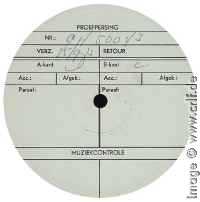

Friday, January 18. 2008

Recently I came across a white label EP on French BARCLAY label. Its number is 70668 and you may know it. It's a 1964 Chuck Berry EP containing Nadine and three other Berry numbers.
The first thing you will notice is that this record neither tells you the name of the artist nor any song titles. (The one I have has some handwritten notes on it which are obviously unrelated and added by a later owner. I removed those from the scan below. As with every scan here, click on it for a higher resolution image).
The printed text on this translates to "Sample, no commercial value". The stamped date might be the date of production. I asked around and Morten Reff told me he owns a similar copy, though his is stamped July 1st.
We could not find out whether these records are test pressings produced for internal checks within the record company, or if this is how Barclay marked their promotional copies given to DJs or dealers. If you can add any knowledge to this, let us know by sending a comment to this entry.
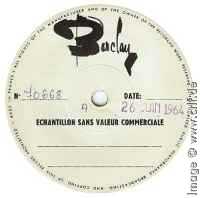

Tuesday, January 15. 2008
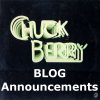
Usually I write only about Chuck Berry records and books I own or at least have physically seen. This is an exception, simply because I and many others are awaiting this book for many years. So finally we are to see at least Volume One of The Chuck Berry International Directory. This book will answer all the questions you continue to send me in email about this and this record you have, about this and this cover, about this and this label...
Here's an edited quote from George Groom-White's press release:
Music Mentor Books of York, England are to publish an extensive reference work about rock'n'roll's most influential guitarist and composer, Chuck Berry.
Compiled by world-renowned Norwegian Berry collector and expert, Morten Reff, THE CHUCK BERRY INTERNATIONAL DIRECTORY will appear in four volumes. Each volume will be around 500 pages long and will retail for GBP 24.99 (approx US$ 50.00).
Volume 1 is scheduled for publication on 15 April 2008 and will contain discographies for over 40 countries, plus dozens of rare label and sleeve illustrations.
Volume 2 will be published later in 2008 and will contain details of bootlegs, radio albums, movies, TV shows, video and DVD releases, international tours, Berry's achievements and awards, his songs, roots and influence on other artists, tributes, Chuck Berry in print, fan clubs and websites, plus annotated discographies of keyboard wizard Johnnie Johnson and the ultimate Berry copyist, Eddy Clearwater.
Volumes 3 and 4 will be published in 2009 and consist of a massive listing of around 4,000 cover versions and some 800 soundalikes on record, in the movies and on TV that bear testimony to Berry's immense influence on Western popular music over the past half-century.
For more information, or to order online, visit the publisher's website: http://musicmentor0.tripod.com.
Given the task of collecting all this information about Chuck Berry record releases, books, DVDs, and cover versions, it is no wonder that Volume One has been promised for years. But now it's near and both Morten and George expect the April release date to be met. YES!
I would not bet anything on the dates George lists for the other volumes, but nevertheless: Write, Morten, write! We are waiting!
Late addition: To pre-order this book, Click Here!

Saturday, January 12. 2008

Over in the Chuck Berry Forum, Johan Hasselberg guided a reader to his description of the Chuck Berry concert recordings available at Wolfgang's Vault. This reminded me to finalize what I was writing on these and other recordings from San Francisco 1967.
During 1967 Chuck Berry was a regular guest at Bill Graham's venues "Fillmore" and "Winterland" in San Francisco. Currently we know of four concerts which have been recorded there and are available to us.
March 19, 1967 - Fillmore West
This concert recording is available for listening at Wolfgang's Vault. Wolfgang's Vault is a commercial operation by Bill Sagan which makes use of the archives of Wolfgang Grajonca, better known as Bill Graham. Until his death in 1991 the famous promoter Bill Graham had collected a huge pile of concert posters, concert recordings, and other musical memorabilia. Some of the contents of Wolfgang's Vault is for sale, such as for instance the original poster to this concert. You cannot purchase a CD with this concert, though. You have to listen to it online or cut yourself a CD with it.
The concert starts out with Berry talking about Bill Graham and how he called him to play there. According to the description on Wolfgang's Vault, the backup band is the later famous Steve Miller Band (Miller, Peterman, Turner, and Davis). You cannot tell, though. The backup band is nothing special at all. In fact, I don't hear Peterman's organ nor Miller's harmonica. The one who can be identified is Bill Graham, though, thanking Berry before the encore.
While this is a concert of Berry's greatest hits with not a single blues number, one track stands out. Listen to track 5 where Berry recites a poem, just like he later did on the San Francisco Dues album in 1971.
June 27 and 29, 1967 - Fillmore West
We usually count these two concerts as one, because this is what has been released by Mercury under the name Live at Fillmore Auditorium (Mercury LP 21138/61138). The first side of this very first Chuck Berry live album was recorded during the June 27 show, the second side during the June 29 show. Again the concert poster is available for sale at Wolfgang's Vault.
The original Mercury LP contained ten tracks of which the first and last were medleys. The LP was later re-issued on CD twice. Be careful which CD you purchase, because their contents is not identical. The re-issue by Rebound Records (314 520 203-2) is available from the usual webstores. It has two songs marked as CD bonus tracks both of which are not! However, the CD indeed comes with three tracks not found on the original album: Good Morning Little Schoolgirl, Reelin' and Rockin', and an early version of My Ding-A-Ling. This re-issue misses the Wee Baby Blues from the LP version, though!
An earlier re-issue by Mercury/PolyGram Records (Mercury 836072-2) contains all ten tracks from the original album, plus the three bonus tracks, and in addition Bring Another Drink and Worried Life Blues.. Unfortunately this more complete CD is long out of print and seems to have been made in very little quantity. If you ever see one, get it!
As before Berry is backed by the Steve Miller Blues Band which in contrast to most other of Chuck's backup bands here really takes part of the show. Most importantly to note is Miller providing second vocals to It Hurts Me Too, but also his prominent harmonica playing e.g. on Flyin' Home greatly enhances this performance. Again Bill Graham is heard introducing Berry, and at the end of the show Chuck asks the audience to applaude "the most wonderful promoter I ever had".
December 29, 1967 - Winterland
This fourth concert of 1967 again is to be heard in Wolfgang's Vault. The concert poster is on sale there as well, a bit expensive, though.
According to the site, Berry is again backed up by the Steve Miller Band. However, given that neither a harmonica is heard nor a duet sung (even though the duet single was out since November), it is to be doubted who in fact played there. Listen carefully to Bill Graham at the end of the show. Does he say "The Steve-Miller-less Steve Miller Band"? Maybe Miller wasn't on stage at all.
Due to this, we hear just another Berry concert typical of that time. Of interest is a very long version of Around and Around. Also Memphis, Tennessee is over 7 minutes long. Two songs are incomplete, probably because someone had to turn the cassette tape. And there is Bye Bye Johnny played as an encore, a title very seldom heard in Berry concerts.
It is a pity that we cannot purchase these concerts on CD from Wolfgang's Vault despite they sell other concerts at least as MP3 files.
How to create a CD from an audio stream
Whether it is legal for Wolfgang's Vault to broadcast these and hundreds of other concerts is a question currently in court. Thus it may happen that these concerts will be removed from the site's playlist at any time. Therefore you may want to create your own backup copy of these concerts. At least here in Germany it is legal to cut yourself a private copy of a radio or Internet broadcast. In fact we have to pay an extra amount on copiers, cassettes, and CD-ROMs which covers the artist's fees. It is not legal to sell such private cuts, so don't ask me.
Here is how you create your own backup copy of the concerts: (a) Hook your old tape deck to the computer speaker port, go to the concert site, press the Record button and let the concert play. (b) Get yourself a software which can record the audio output of your sound card into an MP3 or WAV file. Then burn the file onto a CD-ROM. I recommend to use Jens Fangmeier's Feurio! which is one of the best CD writing packages and the one I use - a licensed version, of course. Feurio! can record the concert and directly burn it onto a CD. Note that Wolfgang's Vault broadcasts each track on its own with short breaks in between. Gluing the tracks together is a bit more work you may not want to go through.
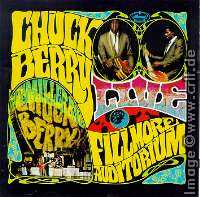
[Update October 2009: Read here about one more Winterland recording.]

Friday, January 11. 2008
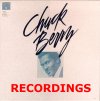
When describing the outcome of Chuck Berry's recording session 9 of January 1957, Fred Rothwell writes about two different takes of a song listed as Lajaunda (Española). One take is listed as the B side of CHESS 1664, Oh Baby Doll. The other take is to be found on the One Dozen Berrys LP (CHESS LP-1432) and all subsequent releases. Fred wrote: The second voice on the Chess 1664 single is a multi-tracked single vocal track, whilst the LP release includes an alternative cut with a true second vocal that is not multi-tracked. The LP version is more appealing because the voices are not perfectly synchronised. When I saw the track listing of Johnny B. Goode - His Complete '50s Chess Recordings (Hip-O Select / Geffen Records B0009473-02) on which Fred collected all Berry recordings including the most interesting alternate takes, I noticed that this recording is on the 4CD-set only once. So where is the alternative take, Fred? His reply: After careful listening to both I decided that they were the same take. There is some aural difference but this I put down to mastering differences. Given this, I sat down with the single, the LP, and a series of CDs. In the end I must confirm Fred's remarks. If you listen carefully, you can definitely hear that both versions have a true second voice track and except for differences in loudness, both versions are exactly the same. There is no alternative take.
While I was at it, I also wondered about this song's name. On the original Chess single, the song is listed as LAJAUNDA - one word. On the One Dozen Berrys LP (CHESS LP-1432) the same spelling is used, though now in two words: La Jaunda. On most reissues there are also two words, but it's La Juanda now, ua instead of au.
So what is correct, I thought. I asked my brother who runs a linguistic services business ( Euglottia) if either Juanda or Jaunda has any meaning. He said that neither has any direct relation to a Spanish word. It's just a name. However, while Juanda is a known name similar to Juan or Juanita, the other form Jaunda is not used as a name. In fact if you google for Jaunda, the Berry song lyrics is the only result you will get. When you listen to what Berry sings, it's also clear that Juanda is the girl's name. Finally one can note that the BMI repertoire (Broadcast Music, Inc. licenses Berry's songs e.g. for radio airplay) also lists this song as La Juanda. So we can conclude that the original spelling Lajaunda simply was a typing error by someone who did not know enough Spanish.
Did Chuck Berry know enough Spanish at that time? Probably not. Just listen to the end of the first verse: "Hablo solo en Español y no comprendo Ingles" does not translate to "I only speak English" but instead to "I only speak Spanish". In the other two verses, the Spanish text matches the English one correctly.
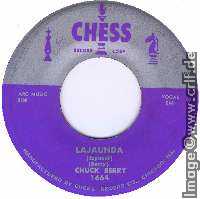 Correction 05-08-2012:
Correction 05-08-2012: There are differences in the two version. Read here on how to spot those.

Tuesday, January 8. 2008

In 1954 Chuck Berry used the alias "Chuck Berry n" when performing in and around St. Louis. Concert announcement posters such as the one shown on pages 92/93 of Berry's Autobiography prove this.
Likewise, American Federation of Musicians' recording contracts show that in 1954 someone by the name of Chuck Berryn played guitar during a recording session for Oscar Washington's Ballad label in St. Louis.
Chuck Berry has never acknowledged that it was him who recorded for Ballad at that time. He always states that his first recording sessions took place in May 1955 for Chess Records of Chicago. However, nowadays most experts such as Fred Rothwell count the Ballad session as Berry's first recording.
Of the unknown number of songs recorded, Washington released two under the name of Joe Alexander and the Cubans: Oh Maria b/w I Hope These Words Will Find You Well.
A recently published CD by Music Productions b.v. of Utrecht, the Netherlands contains these two hard-to-find recordings. Chuck Berry Rocks (Digimode Entertainment GTR39508) was released as part of a series of low-cost CDs covering Rock&Roll legends such as Elvis Presley, Bill Haley, Little Richard, or Gene Vincent.
The CD contains Berry's first six Chess singles, thus twelve early Chess numbers ranging from Maybellene to You Can't Catch Me, though in no particular order. As bonus tracks the CD comes with the two Joe Alexander recordings. Both are in perfect sound quality.
While Oh Maria could be found on the CD Cruisin' Classics Volume 1 (MR DJ 101) before, I Hope These Words Will Find You Well is to be heard on CD for the first time here.
If you plan to buy Chuck Berry Rocks, be aware that its listings in web shops are next to inexistent. Even on amazon you have no chance to locate the CD and ensure that it's the correct item you order. Click here to go to the correct pages on amazon to purchase this CD.
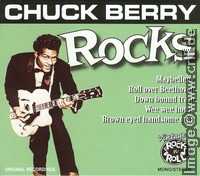

Thursday, January 3. 2008

The following discussion on the various versions of "Betty Jean" took place in email first. It is worth repeating here:
Rick Bergemann asked:
The identical version of "Betty Jean" is included in the "Anthology" and "Rock´n´Roll Rarities" cd´s, and that version differs from the version included on the 1987 cd re-issue of "Rockin´ At The Hops". I asked about this discrepancy long ago and was told that the "Rarites" version was an alternate take and that the "Anthology" version was the originally released version. Obviously that answer was incorrect, because those two versions are the same. And the fact that neither "Rarities" nor "Anthology" lists that particular version as an alternate take (while specifically noting all other alternate takes) leads me to believe that their version is actually the original. Therefore I have strong suspicion that the odd version (included in the "Hops" re-issue) is actually the alternate take. I know that this site is mainly for people who collect vintage vinyl and bootlegs and such and probably won´t think twice about what´s included on recently mass produced cd´s. But if someone of knowledge has a copy of the aforementioned cd´s, can you please listen to the versions of "Betty Jean" and explain the discrepancy clearly. Thank you.
The version on Rarities is known as the alternate version, simply because it´s the one released later. You can distinguish the two best by listening to the Little-Richard-style Oooh´s and Aaah´s both after the first verses and best at the end of the song. In the original the first verse ends with something that sounds like Whoo Ha Oh Baby, Whooo Whooo - while in the alt. version the same part sounds like Oh oh oh Baby, Oh oh oh oh Baby. The 2:25 minute alt version ends with three identical repetitions of Whoo Ha Baby I´m in love with, while the 2:30 minute original ends with Whoo Ha Baby I´m in love with - Whoo Baby I´m in love with YOU - Whoooo I´m in love with you - Whoo Baby (...fading...)
Follow up from Rick Bergemann:
Thank you for the detailed answer. You made it very easy for me to compare the two and confirm which was which. However it leads me to a second question: do you have any knowledge as to why the later version has been included on "Rarities" and "Anthology" without proper notation? "Rarities" includes demos and alt versions as well as originals, yet it does not mention "Betty Jean" as being anything else besides a "stereo remix". "Anthology" compiles only originally released versions (with a couple of entirely unreleased songs thrown in), yet this second version of "Betty Jean" has somehow been included there too. And like "Rarities", the "Anthology" liner notes also fail to note that "Betty Jean" is not the originally released version. Due to the lack of notation on either cd´s liner notes, I can only assume that MCA thought they were putting the original version of "Betty Jean" on both of those compilations.
You are probably correct. Already in 1973 someone at Chess took the wrong tape when collecting the contents for Chuck Berry´s Golden Decade Vol. 2 (Chess LP 60023). This is where the alt. version first appeared, not noted on the cover, too.
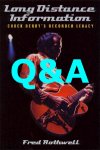
After publication of Fred Rothwell's Long Distance Information book some questions remained unanswered. One of these questions is:
Who were the Ecuadors who backed Chuck Berry in July 1959?
The only thing I noticed is that there were at least two more songs published by this group. Cham Records 181177 (Rockin' Rollin' Vocal Groups) contains "Say You'll Be Mine" by The Ecuadors, Cham Records 80423 (Rockin' Rollin' Vocal Groups Again) contains "Let Me Sleep Woman" by The Ecuadors, and Cham Records 80505 (Rockin' Rollin' Vocal Groups Vol. 4) contains "Sputnik Dance (A. Turner)" and "Stay A Little Closer (McCoy-Kirkland)" by The Equadors. Note the different spelling, though. It may be two different groups. On Cham Records 80505 (Rockin' Rollin' Vocal Groups Vol. 4) the composer for "Sputnik Dance" is listed as (A. Turner) and the composers of "Stay A Little Closer" are listed as (McCoy-Kirkland). Maybe these names point to group members?

Friday, September 1. 2006
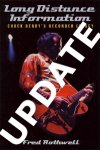
Fred Rothwell's Long Distance Information: Chuck Berry's Recorded Legacy (Music Mentor Books, 2001) is the ultimate book for any serious Chuck Berry record collector: All Berry sessions, all the songs, all the session musicians, where to find which song if ever released, and tons of additional stuff.
First published in 2001 the book consists mainly of a 240 page commented "sessionography", a list of 93 recording sessions Chuck participated in between 1954 and 2000. For each session Fred lists the musicians and the songs recorded, whether released or not. For every song he shows a few main records containing it. He also fully describes and critizises every recording.
Chuck Berry's recorded legacy is not complete yet, though.
Due to the availability of additional bootleg recordings, audience tapes, and multiple commercial DVDs there have surfaced many new details about the sessions which made the Hail! Hail! Rock'n'Roll! film. A complete discussion can be found in the section on Chuck's 60th Birthday Celebrations.
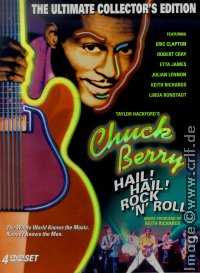

Wednesday, October 12. 2005

Fred Rothwell's Long Distance Information: Chuck Berry's Recorded Legacy (Music Mentor Books, 2001) is the ultimate book for any serious Chuck Berry record collector: All Berry sessions, all the songs, all the session musicians, where to find which song if ever released, and tons of additional stuff.
First published in 2001 the book consists mainly of a 240 page commented "sessionography", a list of 93 recording sessions Chuck participated in between 1954 and 2000. For each session Fred lists the musicians and the songs recorded, whether released or not. For every song he shows a few main records containing it. He also fully describes and critizises every recording.
Chuck Berry's recorded legacy is not complete yet, though. After publication of Fred Rothwell's book we found out about an additional recording session which took place in early 1972:
During the same tour through Europe which resulted in the BBC session of March 1972, German TV station "Radio Bremen" recorded a live version of Johnny B. Goode for their Beat Club TV show. This recording can be seen on the DVD Beat Club - The Best of '72. While in the studio at Bremen, Berry was interviewed. A decade later, Radio Bremen used this interview in issue 15 of their radio series Roll over Beethoven - Zur Geschichte der populären Musik, a series covering the history of rock from the mid 1940s to the late 1970s. And another decade later, the German record label Bear Family re-issued the complete radio series as a box set containing 52 CDs and a 300+ page book. As such the interview or at least four segments of it ended on a commercially available CD and therefore in this description of Berry recordings. The box set is called Geschichte der Popmusik ( Bear Family BCD16300).
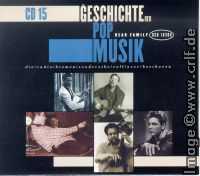

Tuesday, February 22. 2005

Fred Rothwell's Long Distance Information: Chuck Berry's Recorded Legacy (Music Mentor Books, 2001) is the ultimate book for any serious Chuck Berry record collector: All Berry sessions, all the songs, all the session musicians, where to find which song if ever released, and tons of additional stuff.
First published in 2001 the book consists mainly of a 240 page commented "sessionography", a list of 93 recording sessions Chuck participated in between 1954 and 2000. For each session Fred lists the musicians and the songs recorded, whether released or not. For every song he shows a few main records containing it. He also fully describes and critizises every recording.
Chuck Berry's recorded legacy is not complete yet, though. After publication of Fred Rothwell's book we found the following additions regarding Session 26:

Fred Rothwell's Long Distance Information: Chuck Berry's Recorded Legacy (Music Mentor Books, 2001) is the ultimate book for any serious Chuck Berry record collector: All Berry sessions, all the songs, all the session musicians, where to find which song if ever released, and tons of additional stuff.
First published in 2001 the book consists mainly of a 240 page commented "sessionography", a list of 93 recording sessions Chuck participated in between 1954 and 2000. For each session Fred lists the musicians and the songs recorded, whether released or not. For every song he shows a few main records containing it. He also fully describes and critizises every recording.
Chuck Berry's recorded legacy is not complete yet, though. After publication of Fred Rothwell's book we found the following addition regarding Session 27:
I'm in the Twilight Zone can finally be heard by listening to the ARC Music promotional CD The ARC Classics (ARC Music ARC CB 0402). The song is incorrectly titled I'm in the Danger Zone, though.

Fred Rothwell's Long Distance Information: Chuck Berry's Recorded Legacy (Music Mentor Books, 2001) is the ultimate book for any serious Chuck Berry record collector: All Berry sessions, all the songs, all the session musicians, where to find which song if ever released, and tons of additional stuff.
First published in 2001 the book consists mainly of a 240 page commented "sessionography", a list of 93 recording sessions Chuck participated in between 1954 and 2000. For each session Fred lists the musicians and the songs recorded, whether released or not. For every song he shows a few main records containing it. He also fully describes and critizises every recording.
Chuck Berry's recorded legacy is not complete yet, though. After publication of Fred Rothwell's book we found out about an additional recording session which took place prior to or in early 1975:
Prior to 1975 Chuck Berry must have recorded a 30 seconds radio spot telling to get off hard drugs. The recording was made available as part of the National Association of Progressive Radio Announcers' (NAPRA) "Hard drugs awareness movement - Get Off". The radio spot was distributed to radio stations on an album called Get Off II (NAPRA-2, 1975). For details see the section on Radio Show and Promotional Records.
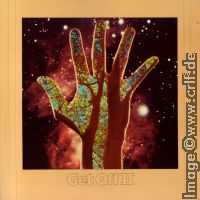
|







